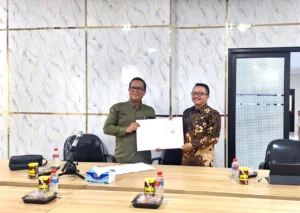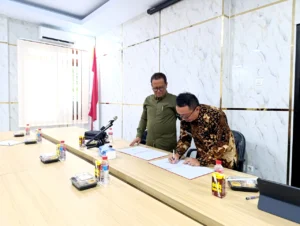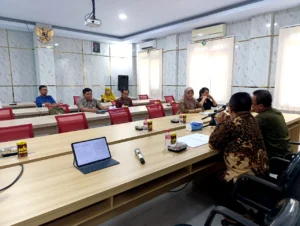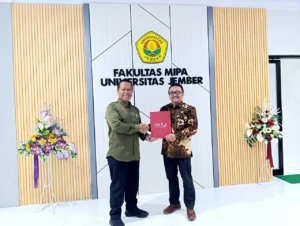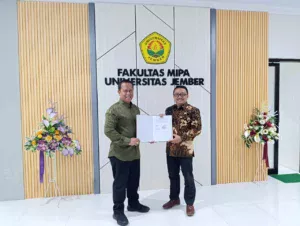 FMIPA UNEJ collaborated with the Jember Regional Forestry service branch (21/2). This collaboration was marked by the signing of a Cooperation Agreement (PKS) between the Dean of FMIPA UNEJ, Prof. Drs. Dafik, M.Sc., Ph.D., and the Head of the Jember Regional Forestry Service Branch, Sapto Yuwono, S.Hut., M.M. The Dean of FMIPA appreciated the collaboration as a step in implementing environmental learning. “Environmental-based learning requires the initiation of activities in the Jember forestry area, including education, research, and community service,” he said. It was also said that FMIPA has collaborated with fostered villages, so that collaboration initiation with forestry partners is needed.
FMIPA UNEJ collaborated with the Jember Regional Forestry service branch (21/2). This collaboration was marked by the signing of a Cooperation Agreement (PKS) between the Dean of FMIPA UNEJ, Prof. Drs. Dafik, M.Sc., Ph.D., and the Head of the Jember Regional Forestry Service Branch, Sapto Yuwono, S.Hut., M.M. The Dean of FMIPA appreciated the collaboration as a step in implementing environmental learning. “Environmental-based learning requires the initiation of activities in the Jember forestry area, including education, research, and community service,” he said. It was also said that FMIPA has collaborated with fostered villages, so that collaboration initiation with forestry partners is needed.
FMIPA through the Mathematics Department with remote sensing can initiate collaboration with the forestry service. “Forestry issues that can be collaborated on with FMIPA, especially mathematics, require sharing sessions to find the right solutions to overcome problems in the Jember forestry area,” continued Prof. Dafik. It is hoped that collaboration will be implemented soon in the form of teaching practices, internships, or other activities that can be collaborated on. The Cooperation Agreement between FMIPA and the Jember Regional Forestry Service Branch has a duration of 2 (two) years since the PKS was signed. On the initial occasion, the Special Purpose Forest Area (KHDTK) was also introduced from the Jember Regional Forestry service branch.
Sapto Yuwono, S.Hut., M.M., Head of the Jember Regional Forestry Service Branch, in his speech explained information related to Law No. 23 of 2013 concerning forestry affairs handled by the district. “There are 10 forestry service branches in East Java along with farmer groups under them,” he explained. It was said that the management of conservation areas by UPT and BKSDA, while protected and production forests are managed by Perhutani. Sapto hopes that collaboration can be accommodated with regional potential, forest farmer groups, utilization of monitoring tools, management of porang, and management and control of sengon tree diseases.
“We give an example of land given by the government to the community that has not been optimally managed; intervention from research lecturers is needed to improve the quality of land that has social and environmental impacts,” said Sapto. For internships and final assignments, students will be formulated immediately because there is still no appropriate model. In the discussion, Deputy Dean I of FMIPA, Prof. Dra. Hari Sulistiyowati, M.Sc., Ph.D., proposed several things that can be collaborated on. “We can collaborate on identifying the conservation status and high conservation value of the area, the value of forest biodiversity, staff training in sampling techniques and data analysis, empowerment of farmer groups, and restoration of forest areas with agroforestry,” she said.

